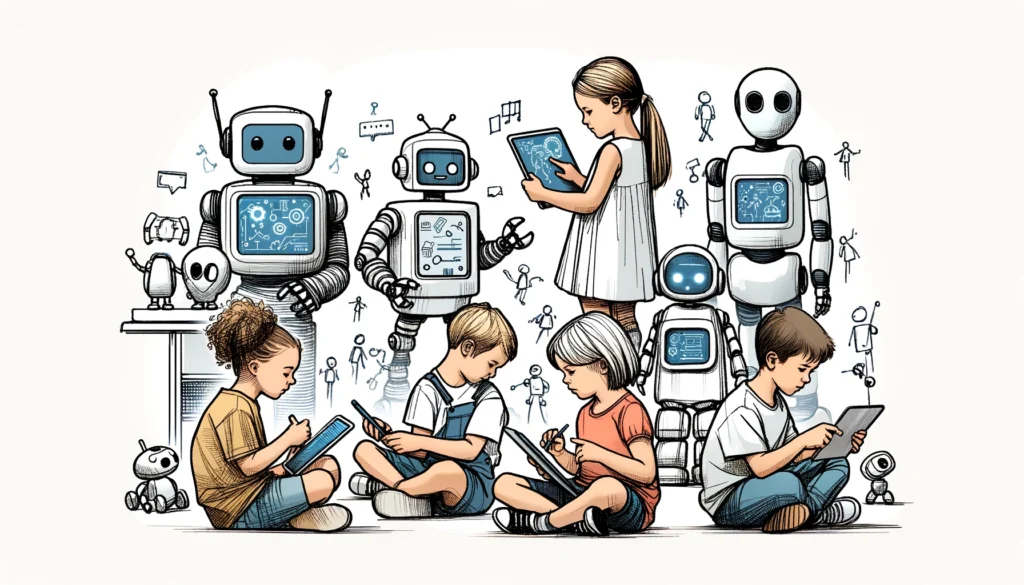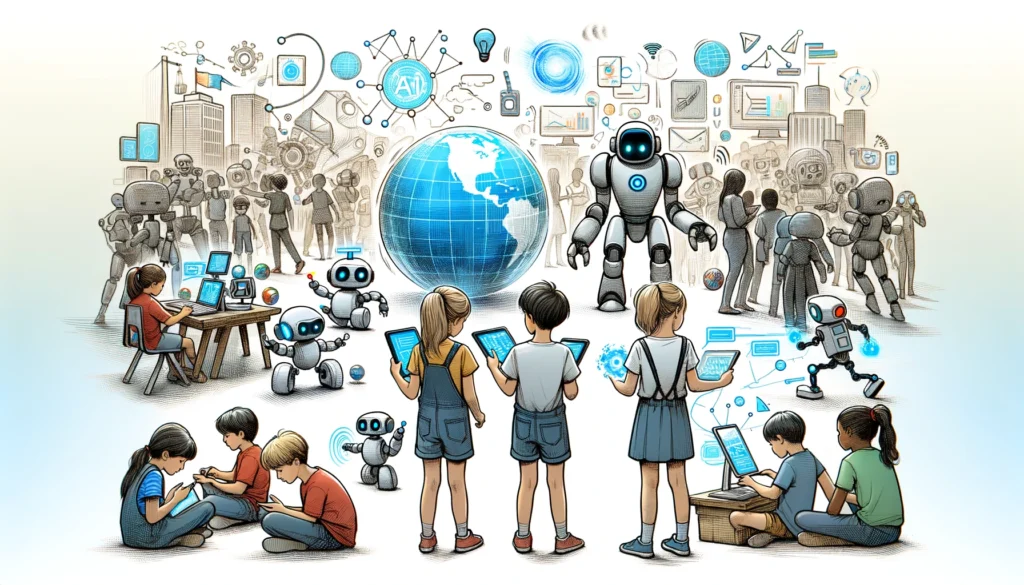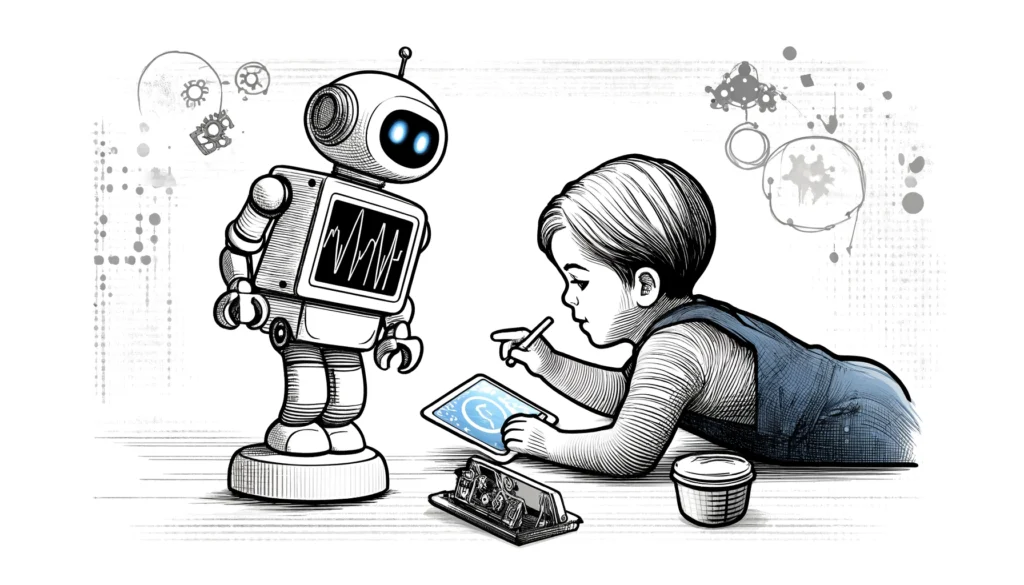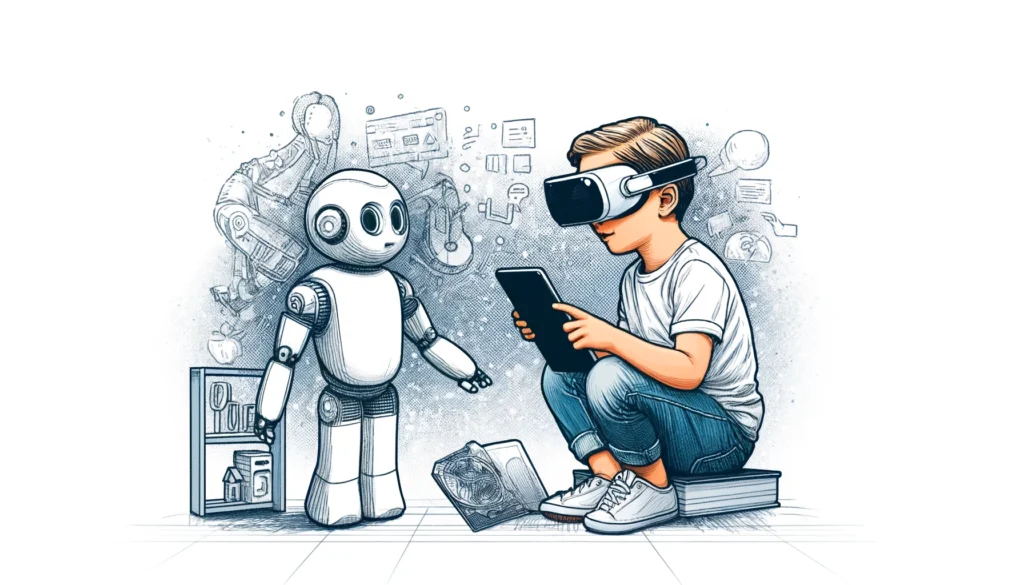
Introduction
As artificial intelligence (AI) continues to permeate every facet of our lives, it’s crucial to equip the younger generation with the skills and knowledge to thrive in this evolving landscape. Here’s a detailed guide on how to prepare children for the world of AI, blending educational trends with practical tips.
Foster Curiosity and Creativity
Encourage Inquiry
Children are naturally curious. Foster this by encouraging them to ask questions about how things work. Engage them in activities that stimulate their imagination and problem-solving skills.
- Activities: Hands-on projects, arts and crafts, and imaginative play.
- Tools: LEGO sets, art supplies, and science kits.
Spark Creativity
Creative thinking is essential for innovation. Provide opportunities for children to explore and create, which helps in developing a problem-solving mindset.

Introduce Basic AI Concepts
Educational Resources
Introduce AI concepts using age-appropriate materials. Simplify complex ideas with books, videos, and interactive tools.
- Books and Videos: Use resources that explain AI in simple terms.
- Interactive Apps: Kid-friendly apps like coding games to teach AI fundamentals.
Develop Computational Thinking
Logical Problem Solving
Computational thinking involves structured problem-solving. Encourage activities that promote logical thinking.
- Puzzles and Games: Engage children with puzzles and coding games.
- Coding Platforms: Use beginner-friendly coding platforms like Scratch.
Promote STEM Education
Strong STEM Foundation
A robust foundation in science, technology, engineering, and mathematics (STEM) is vital. Encourage participation in STEM programs and hands-on experiments.
- School Programs: Enroll in STEM clubs and courses.
- Home Projects: Conduct science experiments and engineering projects.
Emphasize Ethical Thinking
Discuss AI Ethics
Discuss the ethical implications of AI with children. Understanding ethics is crucial for the responsible use of AI technologies.
- Ethical Discussions: Talk about data privacy and bias in AI.
- Real-life Examples: Use case studies to illustrate ethical dilemmas.

Cultivate Emotional Intelligence
Build Emotional Skills
Emotional intelligence (EQ) is as important as technical skills. It involves self-awareness, empathy, and social skills.
- Group Activities: Promote teamwork through group activities and sports.
- Mindfulness: Introduce mindfulness exercises to help manage emotions.
Encourage Lifelong Learning
Foster a Love for Learning
Encourage a continuous learning mindset. Adaptability and curiosity are key in an AI-driven world.
- Reading Habit: Promote regular reading.
- Online Learning: Utilize online platforms for diverse learning opportunities.
Provide Real-World Exposure
Practical AI Applications
Expose children to real-world AI applications to understand its impact and potential.
- Visits and Tours: Arrange visits to tech museums and companies.
- Guest Speakers: Invite AI professionals to share their experiences.
Support Personal Interests
Nurture Individual Passions
Recognize and support children’s unique interests. Personal passions can lead to unique contributions in AI fields.
- Extracurricular Activities: Enroll in classes and clubs that align with their interests.
- Personal Projects: Encourage projects that incorporate technology and AI.
Future Trends in AI
Predictive Analytics
AI will increasingly use predictive analytics to improve urban living. Teaching children about this technology prepares them for future city planning and infrastructure roles.
Autonomous Vehicles
Understanding autonomous vehicles and their technology is essential. Children should learn about the sensors, algorithms, and ethical considerations involved.

Engage in AI-related Activities
AI Workshops and Camps
Participate in AI workshops and camps designed for young learners. These programs offer hands-on experiences and teach AI principles in an engaging way.
- Summer Camps: Look for AI-focused camps that provide a deep dive into AI technologies.
- Workshops: Enroll in weekend or after-school workshops that focus on AI projects.
Interactive AI Tools
Use interactive tools and platforms that allow children to experiment with AI.
- AI Simulations: Engage with platforms that simulate AI environments, helping children understand how AI works in real-time.
- Educational Robots: Invest in educational robots that children can program and interact with, fostering a hands-on learning experience.
Understanding AI in Daily Life
Everyday AI Examples
Show how AI is integrated into daily life to make technology relatable.
- Smart Home Devices: Explain how devices like smart speakers use AI.
- Personal Assistants: Discuss how virtual assistants like Siri and Alexa work using AI algorithms.
Family Discussions
Involve the whole family in discussions about AI and its future impact.
- Dinner Conversations: Regularly discuss new AI developments and their implications during family meals.
- News and Media: Watch documentaries and news segments on AI advancements together to spark interest and conversation.
Conclusion
Preparing children for the world of AI involves a multifaceted approach, blending curiosity, ethical understanding, and technical skills. By fostering these attributes, we can ensure they are ready to navigate and thrive in an AI-driven future.
Sources:
By incorporating these steps and maintaining an adaptive approach, parents and educators can ensure children are well-prepared for a future where AI plays a pivotal role.
FAQ’s
How can parents introduce AI concepts to young children?
Parents can introduce AI concepts to young children through age-appropriate educational toys and apps that incorporate basic AI principles, like pattern recognition and simple problem-solving. Storybooks and animated videos that explain AI in a fun and engaging way can also be effective. Additionally, parents can encourage curiosity and experimentation by asking open-ended questions about how things work and exploring AI-powered devices together.
What are some practical activities to teach kids about AI?
Practical activities to teach kids about AI include using coding games and robotics kits designed for children, which help them understand the basics of programming and machine learning. Parents and educators can also organize interactive workshops where children can build simple AI projects, like creating a chatbot or training a basic image recognition model. Visiting technology museums or participating in online AI courses for kids can further enhance their understanding and interest in AI.
How important is it for children to learn coding and programming in the context of AI?
Learning coding and programming is crucial for children in the context of AI as it provides the foundational skills necessary to understand and develop AI technologies. Coding helps children grasp logical thinking, problem-solving, and algorithmic concepts, which are essential for creating and working with AI systems. Early exposure to programming also fosters creativity and innovation, preparing children for future careers in technology and AI-driven industries.
What role do schools play in preparing children for the AI world?
Schools play a vital role in preparing children for the AI world by integrating AI education into their curriculum through coding classes, STEM programs, and specialized AI courses. Educators can use project-based learning approaches to teach students about AI applications and ethical considerations. Schools can also partner with technology companies and organizations to provide students with hands-on experiences and access to the latest AI tools and resources.
How can we ensure children understand the ethical implications of AI?
To ensure children understand the ethical implications of AI, parents and educators should discuss real-world examples of AI applications and their societal impacts, both positive and negative. Encouraging critical thinking and ethical discussions around AI use, such as privacy concerns, bias in algorithms, and the potential for job displacement, is essential. Providing resources like documentaries, articles, and interactive discussions with AI experts can help children grasp the importance of ethical considerations in AI development and usage.
How can parents prepare children for a future dominated by AI?
Parents can encourage curiosity and learning by providing resources on AI and technology. Enrolling children in coding and STEM courses can build foundational skills. Promoting critical thinking and problem-solving through games and activities can also prepare them for future AI challenges.
What are some key skills children should develop for the AI-driven future?
Children should develop skills in coding, data analysis, and computational thinking. Creativity, adaptability, and collaboration are also crucial as they enable children to navigate and innovate in an AI-driven world. Encouraging continuous learning and curiosity will help them stay updated with technological advancements.
Why is it important for children to understand AI?
Understanding AI is important as it will be integral to many future careers and everyday life. It helps children to become informed users and creators of technology, fostering responsible and ethical use. Early knowledge of AI also enhances their ability to solve complex problems and think critically about technology’s impact on society.
How can schools integrate AI education effectively?
Schools can integrate AI education by incorporating coding and robotics into the curriculum. Providing hands-on projects and real-world problem-solving opportunities can make learning engaging and practical. Collaborations with tech companies and using AI tools in the classroom can also enhance understanding and application of AI concepts.
What role do extracurricular activities play in preparing children for AI?
Extracurricular activities such as coding clubs, robotics teams, and science fairs provide practical experience with AI and technology. These activities promote teamwork, problem-solving, and innovation, which are essential for thriving in an AI-driven future. They also offer a fun and interactive way for children to deepen their understanding of AI.